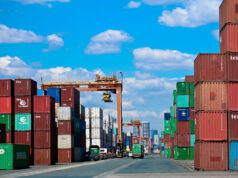Pandemic slashes remittance lifeline as overseas Filipino workers lose jobs
By Charmaine A. Tadalan
Reporter
MELBA ARBOSO, 34, failed to send P6,000 to her family last month after she temporarily lost her job as a spa attendant amid a lockdown in the Kingdom of Bahrain where almost 4,000 people have been infected with the coronavirus.
“I haven’t been able to send money home since we got locked down,” the single mother of a 15-year-old girl back in the Philippines said in a Messenger chat. “I’ve been using my remittance budget to get by.”
Ms. Arboso is just one of about 10 million Filipino workers overseas who have been affected by the novel coronavirus that has sickened nearly four million and killed at least 273,000 worldwide.
The government calls them “modern heroes” because remittances they send home provide a steady stream of foreign exchange to help offset the widening trade gap and limit the current account deficit.
Personal remittances — whether in cash or in kind and capital transfers between households — hit a record $33.5 billion last year, a 3.9% increase from a year earlier and accounting for almost a 10th of the Philippine economy, data showed.
The data only counted money sent home by 2.3 million overseas Filipinos through official channels such as banks and remittance centers.
Now, that money stream is in danger of being choked as Filipino workers abroad lose their jobs amid the pandemic, and as travel restrictions and the closure of some companies overseas cut their deployment.
Global job losses that the International Labour Organization (ILO) had estimated to reach 25 million this year is turning the $715-billion global remittance industry upside down.
Global remittances are expected to fall by 20% this year due to the economic crisis induced by the COVID-19 (coronavirus disease 2019) pandemic and shutdown, according to the World Bank.
The projected decline, which would be the sharpest in history, is largely due to a fall in the wages and employment of migrant workers, who tend to be more vulnerable to loss of employment and wages during an economic crisis in a host country, it said in a report last month.
‘VITAL SOURCE’
Remittances to low and middle-income countries are projected to fall by 19.7% to $445 billion, representing a loss of a crucial financing lifeline for many vulnerable households.
Remittance flows to the East Asia and Pacific region, which includes the Philippines, are expected to fall by 13% this year from $147 billion in 2019.
“Remittances are a vital source of income for developing countries,” World Bank Group President David Malpass said last month. “The ongoing economic recession caused by COVID-19 is taking a severe toll on the ability to send money home and makes it all the more vital that we shorten the time to recovery for advanced economies.”
More than 89,000 Filipinos overseas had either been displaced or were on a no-work, no-pay status due to lockdowns and slowdown of businesses in host countries, according to the Philippines’ Department of Labor and Employment.
“The resulting lockdowns are meant to better contain the COVID-19 outbreak, which could have far greater costs to the global economy if left unchecked,” Michael L. Ricafort, chief economist at Rizal Commercial Banking Corp. in Manila, said in e-mailed comments late last month.
He said a sharp decline in most economies around the world, with some risk of recession especially in the biggest host countries could cut the demand for Filipino workers overseas.
Plunging global oil prices could also slow Middle Eastern economies that host millions of Filipinos.
“The most appropriate monetary and fiscal policy measures, interventions and responses worldwide are needed immediately to prevent this health issue from evolving into something that is more economic and financial in nature,” Mr. Ricafort said.
The Philippine government has repatriated almost 25,000 Filipino workers during the health crisis, mostly seafarers displaced by the pandemic, according to the Foreign Affairs department.
The Tourism department earlier said it had secured more than 11,000 hotel rooms to house some of the Filipino workers from abroad during quarantine.
Some of them have been harassed and discriminated against along with frontline health workers after they were barred from entering supermarkets or evicted from their rented homes for being alleged virus carriers.
The government has approved about 86,000 applications for a one-time P10,000 financial aid for overseas Filipinos who lost their jobs due to the coronavirus pandemic, the Overseas Workers Welfare Administration said last month.
The agency also said it had released P207 million worth of aid to 20,739 workers who returned.
WAITING IT OUT
Camille Jazul-Salita, a 28-year-old beauty adviser for Qatar Airways where she earned as much as P70,000 a month, was one of those who came home.
“I was planning to resign in August but I did it earlier because of the coronavirus disease 2019,” she said in a Messenger chat, citing the grave outbreak in Qatar where more than 17,000 people have been infected.
“I prefer to be with my family during times like this,” the newlywed from Imus, Cavite province said, adding that she plans to enrol in a baking class at a state-owned technical school while in the Philippines.
The government should create a registry of overseas Filipinos who came home and identify industries that can employ them, Rene O. Ofreneo, professor emeritus at the University of the Philippines, said by telephone.
“The government should find a way to provide jobs for them,” said the former UP School of Labor and Industrial Relations dean. “There should be a registry of skills and know-how.”
The Labor department has said it seeks to offer a million jobs in the next three months including in infrastructure in the provinces.
Ms. Arboso, the spa attendant, chose to wait it out in Bahrain, where the lockdown was expected to end on May 7.
She’s almost out of leave credits, which her company had been converting to ensure a steady income flow to its workers. “It might be gone once my leave credits are exhausted,” she said.
Ms. Arboso has no plans to come home anytime soon even if the outbreak in Bahrain worsens. “It’s easier to find jobs here. It’s faster to get back on our feet here than in the Philippines.”



